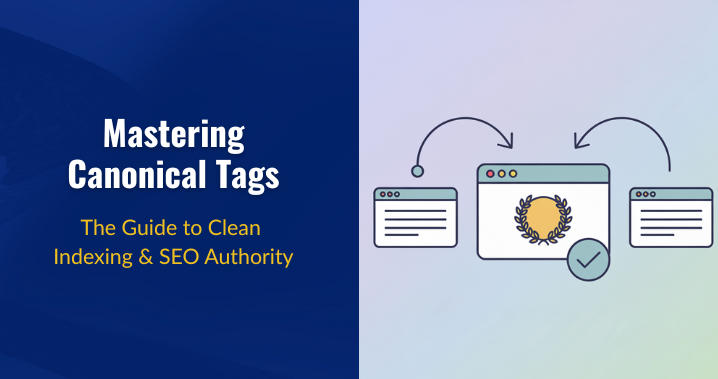
Running a business website in 2025 means dealing with ever-evolving SEO challenges — from mobile-first indexing to AI-driven ranking systems. Yet, one thing that remains constant is the importance of canonical tags.
For business owners in Toronto, especially those managing content-heavy websites, canonical tags are vital for ensuring search engines understand which version of a page to index. As a leading SEO Agency in Toronto, we regularly find that improper canonicalization is one of the most common technical SEO issues affecting rankings.
Why Do Canonical Tags Still Matter?
Canonical tags help you control how Google and other search engines interpret duplicate or similar content across your website. By using them correctly, you tell search engines which version of a page should appear in search results — consolidating link equity, preventing duplicate content penalties, and keeping your indexing clean.
In 2025, with Google’s algorithm heavily focused on technical SEO signals and site quality, proper canonicalization remains a core best practice. Without it, you risk diluting your rankings, confusing crawlers, and wasting valuable crawl budget on unnecessary duplicate pages.
Common Problems Caused by Missing Canonical Tags
(Before jumping into the issues, let’s quickly recap why missing canonical tags can quietly hurt your rankings.)
Many Toronto business websites unknowingly host duplicate versions of the same content — for example:
- Multiple URLs showing identical pages (due to tracking parameters or sorting filters)
- Both HTTP and HTTPS versions accessible online
- “www” and “non-www” versions coexisting
- Uppercase and lowercase URLs treated as separate pages
These situations create confusion for search engines. Without canonical tags, they may index the wrong version or split ranking signals among several duplicates. This can directly impact your site visibility and organic traffic.
Before You Implement Canonical Tags
Setting canonical tags isn’t difficult, but precision is key. Before applying them, keep these technical details in mind:
- Use absolute URLs: Always use the full URL (e.g., https://www.example.com/page) rather than relative paths. It provides clear guidance to search engines.
- Ensure HTTPS consistency: If your site has an SSL certificate, your canonical URLs must use HTTPS. Pointing to HTTP versions can cause indexing errors and weaken trust signals.
- Keep URLs lowercase: Search engines treat uppercase and lowercase URLs differently. Always canonicalize the lowercase version.
- Add self-referential canonical tags: Each important page should include a canonical tag pointing to itself. This helps clarify your preferred version, especially when URL variations exist.
- Avoid multiple canonicals on the same page: If more than one canonical tag is present, search engines may ignore both, negating your efforts.
Implementing these correctly ensures your canonical tags work as strong signals — aligning with your site’s technical SEO structure and helping Google understand which URLs represent your best content.
How to Implement Canonical Tags Effectively?
There are several reliable methods to implement canonical tags. The right one depends on your website setup and content type.
1. HTML Canonical Tag
The most common and straightforward method. Simply add this line to the head section of your page:
<link rel=”canonical” href=”https://www.example.com/preferred-page/” />
If your site runs on WordPress, SEO plugins like Yoast or Rank Math allow you to set canonical URLs easily without coding.
2. HTTP Header
For non-HTML assets (like PDFs or dynamic files), you can specify the canonical in the HTTP header:
Link: <https://www.example.com/preferred-page/>; rel=”canonical”
This is useful when you can’t edit the page’s HTML directly.
3. Sitemap Entries
Include only canonical URLs in your sitemap.xml file. This reinforces your preferred versions to search engines and ensures efficient crawling of high-value pages.
4. 301 Redirects
When you have older or duplicate URLs that should no longer exist, use 301 redirects to point users and crawlers to the canonical version. It passes link equity and strengthens your ranking signals.
5. Internal Linking Consistency
While not a canonical tag itself, your internal linking structure plays a supporting role. Ensure all internal links point to the canonical version of a page. This consistency helps search engines understand which version carries authority.
How to Verify If Your Canonical Tags Work?
Once you’ve implemented canonical tags, it’s crucial to make sure they’re functioning correctly. You can use tools like Google Search Console’s URL Inspection feature or third-party crawlers such as Screaming Frog. These tools show how Google interprets your canonical links and highlight any mismatches between your intended and detected URLs.
Why Does It Matter for Toronto Businesses?
For local businesses across Toronto and the GTA, maintaining a clean, crawl-efficient website is essential. Whether you run an e-commerce store, a service-based website, or a corporate portal, duplicate URLs can quietly eat away at your ranking potential.
Canonical tags, when implemented correctly, protect your site from duplicate-content confusion and ensure that only your strongest, most relevant pages appear in Google’s search results. Combined with a solid SEO audit, they lay the groundwork for long-term organic growth.
In 2025 and beyond, search algorithms are becoming smarter, prioritizing well-structured websites with clear signals. By maintaining correct canonicalization, you ensure your site meets Google’s latest quality and indexing standards — and that your pages compete effectively for top positions.
Check Your Canonical Health
Here’s a quick checklist to evaluate your website’s canonical setup:
- Does each important page contain a self-referencing canonical tag?
- Are all canonical URLs HTTPS, lowercase, and consistent?
- Is your sitemap clean and free of duplicate URLs?
- Are old or alternate URLs redirected to the canonical version?
- Do your internal links consistently point to canonical pages?
Addressing these areas will help improve crawl efficiency, boost indexation accuracy, and strengthen your site’s overall SEO health.
Work With Toronto’s Trusted SEO Experts
If you’re unsure whether your website’s canonical tags are correctly implemented, now is the best time to check. As a results-driven SEO Agency in Toronto, Pat’s Marketing can perform a detailed SEO audit to identify and fix issues like canonical conflicts, crawl inefficiencies, and duplicate content errors.
Let’s ensure your website sends the right signals to Google — every time.
Call us today at 437-826-9333 to schedule a free consultation and take the first step toward a cleaner, faster, and better-ranked website.


